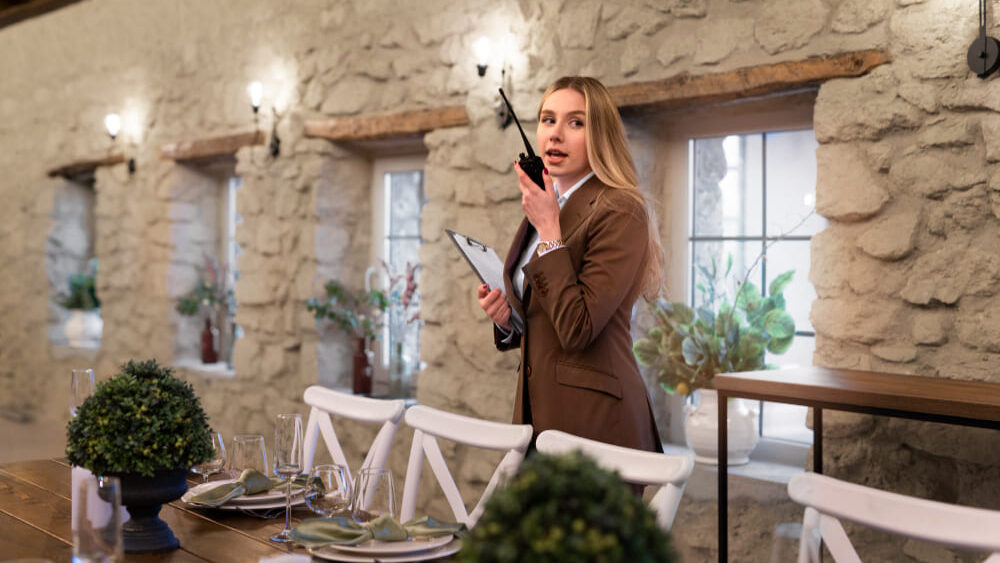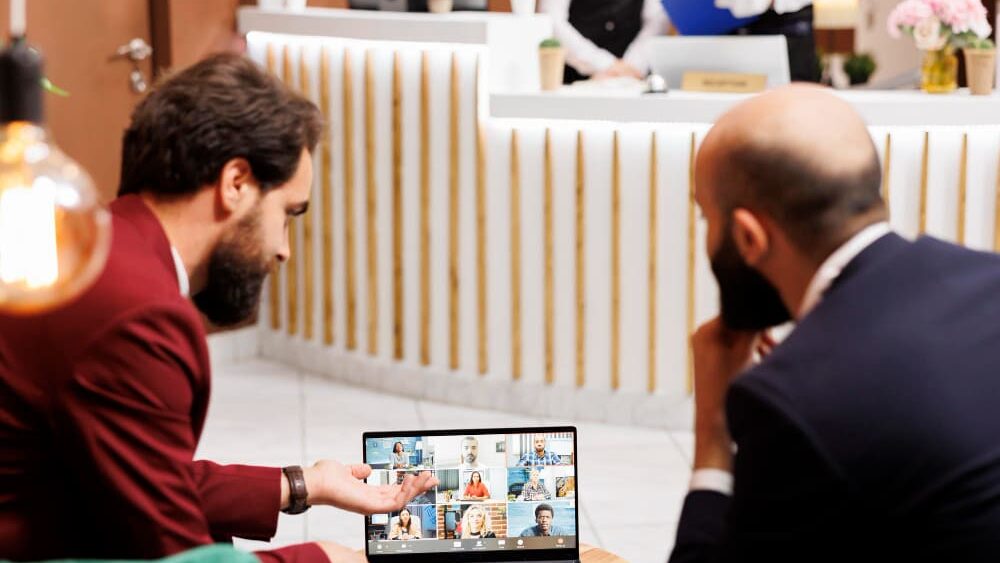Event coordination is more than managing schedules and booking vendors. It is about designing experiences that people will remember long after the event ends. From corporate conferences to weddings and fundraisers, success depends on bringing together countless moving parts into one seamless flow.
It is a role that demands organization, creativity, and problem-solving under pressure. Done right, it turns complex challenges into unforgettable moments.
In this guide, you will learn everything you need to know about event coordination: the essential skills, the responsibilities, and the best tools to make the job easier. Whether you are new to the field or ready to take your expertise to the next level, this guide will give you practical strategies and proven best practices.
Let’s dive in! 🎉
What Is Event Coordination?
Event coordination is the art of turning plans into reality, making sure every detail comes together to create a seamless event experience. While event planning is all about big-picture ideas—like picking the perfect venue, setting a theme, and hiring vendors, coordination is where the magic happens. It’s about ensuring everything actually works on the day of the event.
Think of it this way: planners are the architects who draw the blueprints, and coordinators are the builders who bring those designs to life.
This difference might seem small, but it’s critical. A well-planned event can still fall apart without proper coordination. From managing schedules and vendors to handling equipment deliveries and ensuring speakers stick to their time slots, coordinators are the ultimate multitaskers. They’re also the go-to problem solvers when things go sideways, like a last-minute tech issue or a late catering delivery.
Why is this role so important? The event industry is booming. Did you know that it’s projected to grow by 7% between 2023 and 2033, according to the U.S. Bureau of Labor Statistics? That’s faster than most other professions! With the rise of virtual, hybrid, and in-person events, the demand for skilled coordinators is higher than ever.
So, what makes a great event coordinator? It comes down to three key principles:
- Staying Organized: Coordinators thrive on schedules, timelines, and checklists. Without them, it’s chaos.
- Strong Communication: You’ll be the glue between vendors, staff, and clients, so clear and timely communication is non-negotiable.
- Quick Problem-Solving: From a projector that won’t work to unexpected rain, you need to think on your feet.
Event Coordination Checklist
Track every step of your event planning process. Progress saves automatically.
Planning 0/3
Budgeting 0/3
Venue 0/3
Vendors 0/3
Logistics 0/3
On-site 0/3
Post-event 0/3
Why Event Coordination Is a Crucial Skill
Let’s face it; events can either be unforgettable experiences or logistical nightmares. That’s why mastering event coordination is such a valuable skill. It’s not just about making sure things run on time (though that’s huge); it’s about creating efficiency, keeping guests happy, and delivering real results.
First, let’s talk efficiency. Good coordination keeps everything running like clockwork—no wasted time, no overspending, no unnecessary chaos. When you’re working with a tight budget or a packed schedule, being able to streamline tasks and maximize resources can make all the difference.
Now, think about guest satisfaction. When an event runs smoothly, whether it’s a conference, a gala, or a team retreat, attendees notice. They’ll remember the seamless check-in process, the perfectly timed presentations, and the overall vibe of an event that just “works.” Happy guests are more likely to come back for future events and even recommend them to others. That’s a win for your reputation and your bottom line.
And speaking of the bottom line, event coordination is a key driver of ROI. When you manage budgets wisely, negotiate with vendors effectively, and align every detail with the event’s goals, you’re setting up the event for financial success. In fact, studies show that 52% of CEOs believe event marketing delivers a better return on investment than any other marketing channel.
At the end of the day, event coordination is more than just keeping things organized—it’s about making every detail count. Whether you’re trying to save time, wow your audience, or boost profitability, strong coordination skills are your secret weapon.
What Are the Differences Between Event Coordinators and Event Planners?

An event planner is like the architect of an event. They’re the ones who map out the big picture—designing the theme, choosing the venue, and managing the budget. Planners handle tasks like:
- Coming up with creative event concepts.
- Finding and booking the perfect venue.
- Negotiating with vendors and securing contracts.
- Organizing the overall design, from decor to ambiance.
Meanwhile, an event coordinator is more like the project manager who brings that vision to life. They focus on the logistics and execution, ensuring everything runs smoothly on the day. Coordinators are in charge of:
- Managing on-site operations and troubleshooting issues.
- Coordinating with vendors, venue staff, and the event team.
- Overseeing event setup and breakdown.
- Ensuring guest registration and schedules stay on track.
To put it simply: planners plan, and coordinators execute. Both roles are essential, and when they work together seamlessly, the result is an event that feels effortless to guests—even though a ton of work went into making it happen.
What Skills and Qualifications Do You Need as an Event Coordinator?
Being an event coordinator is no small task—it takes the right mix of education, experience, and skills to bring events to life seamlessly. If you’re considering stepping into this role, here’s what you’ll need to succeed.
Qualifications: You don’t always need a specific degree to become an event coordinator, but having a background in fields like marketing, communication, business, or hospitality management can give you a strong foundation. These areas teach you about organization, communication strategies, and understanding client needs, all critical when coordinating events.
Relevant Experience: Hands-on experience is where the real learning happens. Whether you’ve volunteered at events, worked as an assistant, or helped plan a school fundraiser, every bit of experience counts. These roles teach you the ins and outs of managing vendors, organizing schedules, and dealing with last-minute hiccups. It’s all about learning by doing.
Key Skills to Master
- Time Management: You’ll be juggling a hundred things at once, so staying on schedule is non-negotiable.
- Problem-Solving: Things go wrong—it’s inevitable. Your ability to think quickly and find solutions is a lifesaver.
- Attention to Detail: Overlook a small detail, and it could throw off the entire event. Stay sharp!
- Communication Skills: You’ll be coordinating with clients, vendors, and teams, so clear and effective communication is a must.
- Leadership: Managing a team means keeping everyone on track and motivated.
- Budgeting: Events aren’t cheap, and knowing how to stretch a budget without compromising quality is a superpower.
▶️ Strong team collaboration is crucial for event coordinators. Adopting frameworks like Scrum can help you optimize workflows and enhance team productivity. Learn more about how Scrum can drive 8X productivity in our Scrum Project Management Guide.
What Are the Responsibilities of an Event Coordinator?
Do’s & Don’ts of Event Coordination
Flip between practical do’s and don’ts for each stage of your event. Use this to sanity‑check your plan.
Event coordinators are the behind-the-scenes masterminds who make sure every part of an event comes together without a hitch. Their job is all about keeping things organized, solving problems, and ensuring the experience is smooth and enjoyable for everyone involved. Here’s what they do:
- Organizing Vendors, Entertainment, and Speakers: Coordinators work with various people—caterers, musicians, keynote speakers, and more. They’re responsible for finding the right fit, negotiating contracts, and making sure everyone knows where to be and when.
- Planning Layouts, Seating, Dining Arrangements, and Logistics: Whether it’s setting up a banquet hall or arranging an outdoor festival, event coordinators design layouts that maximize space, flow, and comfort. They manage seating charts, dining plans, and all the small details that guests don’t even realize had to be planned.
- Handling Equipment and Supply Deliveries: From sound systems to floral arrangements, it’s the coordinator’s job to ensure everything arrives on time, is set up properly, and is ready to go when needed. This often involves managing delivery schedules and troubleshooting any delays or issues.
- Managing Event Finances: Budgets are a huge part of event coordination. Coordinators track every expense, prioritize spending, and look for ways to stay within financial limits without sacrificing quality. It’s about making every dollar count.
- Supervising Event Staff and Day-of Operations: On the day of the event, the coordinator becomes the go-to person. They oversee staff, address last-minute issues, and make sure everything runs according to plan. Essentially, they’re the calm in the storm, keeping everything on track.
In short, event coordinators are the glue that holds events together. They thrive on organization, adapt quickly when plans change, and make sure every guest leaves with a smile.
If you’ve ever attended a flawlessly executed event, chances are, there was a skilled coordinator working tirelessly behind the scenes to make it happen. Time management on event day is critical to keeping everything on schedule. Explore our guide on Reducing Duration of Project Management: 10 Hacks for expert tips to work more efficiently under pressure.

What Kinds of Events Will You Run as an Event Coordinator?
As an event coordinator, no two days are ever the same because the types of events you’ll manage are as varied as the people attending them. Here’s a closer look at the kinds of events you’ll bring to life:
Corporate Events: Think conferences, seminars, product launches, and team-building retreats. Corporate events are all about achieving business goals, whether that’s training employees, networking, or unveiling the next big thing. As the coordinator, you’ll handle everything from securing the venue to managing speaker schedules and making sure the event reflects the company’s brand.
Trade Shows: These are massive networking hubs where businesses showcase their products and services. Your job? Organizing exhibitor logistics, setting up the floor plan, and making sure everything—from booth setup to attendee flow—runs like clockwork. Trade shows require a unique mix of technical precision and people skills.
Fundraisers: From charity galas to fun runs, fundraisers are all about bringing people together for a cause. As the coordinator, you’ll focus on creating an engaging experience that encourages donations while highlighting the mission of the organization. It’s not just about logistics—it’s about making an emotional connection with attendees.
What Should You Keep in Mind While Coordinating Online Events?

Coordinating online events can feel like juggling a lot of moving parts in a virtual space, but with the right strategies, you can create engaging and impactful experiences for your audience. Here’s what you should keep in mind:
Start with Clear Goals: Before you even pick a platform or start planning, ask yourself: What’s the purpose of this event? Are you looking to educate, entertain, or promote? Defining your goals early will keep you focused and help you measure the event’s success later.
Pick the Right Platform: Not all platforms are built the same. Choose one that fits the type of event you’re running. For instance, Zoom might be great for workshops, while platforms like Hopin or Airmeet are better for large conferences with networking options. Make sure the platform supports essential features like live polls, breakout rooms, and Q&A sessions to keep things interactive.
Keep Your Audience Engaged: Let’s face it—keeping people’s attention during a virtual event can be tricky. To avoid Zoom fatigue, include interactive elements like live polls, quizzes, and breakout sessions. Encourage participation with Q&A opportunities or even fun icebreakers.
Prepare for Technical Glitches: Technology is great—until it isn’t. Prevent hiccups by doing a run-through beforehand, ensuring everyone knows how to use the platform, and having tech support on standby during the event. Simple instructions for attendees on how to log in and troubleshoot common issues can also save the day.
Track Engagement and Gather Feedback: Use tools to monitor how attendees interact with your event, such as how many stayed for the whole session or which features they used most. After the event, send out a quick survey to understand what they loved and what could improve. Feedback is your best friend for planning future events.
Event Coordination Fundamentals
Event coordination is all about bringing a vision to life. It’s the process of organizing and managing every detail of an event so everything runs smoothly, from start to finish. Think of it as the engine that keeps the entire event moving. Coordinators handle logistics, manage schedules, work closely with vendors, and tackle any issues that pop up along the way.
So, how does event coordination differ from event planning? While planners focus on the big picture—like setting objectives, picking themes, and selecting venues—coordinators focus on execution. If planners are the architects designing the blueprint, coordinators are the builders who make sure every piece of that design is executed perfectly on the day of the event.
Key Components of Event Coordination
- Budgeting: Creating and sticking to a budget is critical. This means knowing where to allocate funds—whether it’s for the venue, catering, or entertainment—while avoiding overspending. Smart budgeting ensures no surprises down the line.
- Scheduling: A well-planned timeline is a coordinator’s best friend. From early planning deadlines to the event-day schedule, every task needs a clear time frame to keep things running smoothly.
- Team Collaboration: No event happens without teamwork. Coordinators must communicate clearly and ensure that everyone—vendors, staff, and team members—knows their role and how it fits into the bigger picture.
- Vendor Management: Choosing reliable vendors and managing those relationships is a cornerstone of success. Coordinators handle everything from contract negotiations to making sure deliveries and services arrive on time.
Principles of Event Coordination
- Organization: Staying organized is non-negotiable. Detailed checklists, thorough documentation, and a structured approach are essential for keeping things on track and avoiding chaos.
- Planning: The foundation of a great event is careful planning. This means setting clear goals, understanding your audience, and preparing for every possible scenario well in advance.
- Communication: Effective communication is key—whether you’re talking to your team, vendors, or clients. Everyone needs to be on the same page to avoid confusion and ensure a unified effort.
- Attention to Detail: The little things matter. It’s often the details—like the layout of a room, the timing of a speech, or the ambiance created by decor—that elevate an event from “good” to unforgettable.
Event Coordinator Responsibilities
As an event coordinator, your job is to make sure all the moving parts of an event come together seamlessly. It’s a role that requires strong organization, clear communication, and a good dose of adaptability. Let’s dive into the key responsibilities and how you can excel at each one.
Organizing Vendors, Entertainment, and Speakers
Finding the right vendors and talent is a big part of your job—and it’s not just about picking the first option that comes along. Look for vendors with experience in your event type (corporate events, weddings, fundraisers, etc.) and check reviews or references to make sure they’re reliable. When negotiating, be upfront about your budget and needs, but also try to build long-term relationships. Vendors who know and trust you are more likely to go the extra mile.
Planning Layouts, Seating, Dining Arrangements, and Other Logistics
Good event layouts don’t just look nice—they’re functional. Use tools like Social Tables or Allseated to create detailed floor plans and seating charts. These platforms let you visualize how guests will move through the space, which helps you avoid bottlenecks or awkward setups.
For dining, think about more than just table placement. Ensure seating arrangements encourage conversation and consider special dietary needs when planning menus. Logistics like AV equipment placement and restroom access might not seem glamorous, but they make a huge difference in guest experience.
Handling Ordering and Deliveries of Equipment and Supplies
Keeping track of orders and deliveries is all about staying organized. Use tools like Trello or even a simple spreadsheet to monitor what you’ve ordered, when it’s arriving, and who’s responsible for setting it up. A quick follow-up with vendors 48 hours before delivery can save you from any unpleasant surprises.
And let’s face it—sometimes things go wrong. Have a backup plan ready for common issues like late deliveries or equipment failures. A good rental company on speed dial can be a lifesaver.
Managing a Team of Event Staff
Your team is your backbone on event day, so set them up for success. Assign specific roles—like someone for registration, vendor check-ins, or guest assistance—and make sure everyone knows exactly what’s expected of them.
Before the event, hold a quick team briefing to go over the schedule and key details. Keep communication simple and direct. Apps like WhatsApp or Slack can help your team stay connected without constant interruptions.
Remember, good leadership is about trust. Let your team own their tasks, and step in only when they need support. A confident and empowered team is one that gets the job done.
Supervising on the Day of the Event
Event day is where all your preparation pays off—or gets tested. Keep a detailed event timeline handy, and stay calm and approachable so your team, vendors, and clients know they can count on you.
Be proactive. If you spot potential issues—like a vendor running late—act quickly to adjust the plan. Walk the venue regularly to check that everything is on track and resolve small problems before they escalate.
Having a contingency plan for common hiccups (like bad weather or last-minute no-shows) can be a lifesaver.
And remember: your calm demeanor sets the tone for everyone else. When you stay cool under pressure, it helps everyone else do the same.
Key Skills and Career Growth
While you don’t always need a specific degree, having a background in fields like communications, business, or hospitality gives you a strong foundation. Want to take it up a notch? Consider certifications like the Certified Meeting Professional (CMP) or Certified Special Events Professional (CSEP). These credentials can set you apart in a competitive market and demonstrate your expertise to potential clients or employers.
For instance, the CMP certification, offered by the Events Industry Council, requires significant hands-on experience and a thorough understanding of event management principles. It’s like a gold star on your resume that shows you mean business.
Gaining Relevant Experience
Nothing beats real-world experience. Internships or part-time roles with event planning companies, non-profits, or corporate teams are the best way to get your feet wet. By jumping into tasks like vendor coordination, event logistics, or on-the-day execution, you’ll learn what it really takes to pull off a successful event. Plus, you’ll build a professional network, which is invaluable in this industry.
Pro tip: Volunteering for charity events or fundraisers can also give you hands-on experience and help you develop key skills in a lower-pressure environment.
Core Skills Every Event Coordinator Needs
- Multitasking: Managing multiple moving parts—vendors, timelines, clients—at the same time is part of the job. Staying organized and focused is essential to making it all come together.
- Budgeting: Events can be expensive, so knowing how to stretch a dollar is key. Negotiating smart deals, tracking expenses, and planning for contingencies are all part of the budgeting game.
- Communication: Whether you’re presenting ideas to a client or negotiating with vendors, clear and effective communication makes everything smoother. It’s also the secret sauce for keeping your team aligned.
- Leadership: Coordinators are the glue that holds the team together. Delegating tasks, motivating the crew, and solving conflicts with confidence are skills that can take you far.
Salary and Career Progression
As of 2023, the median salary for event planners in the U.S. is around $56,920 per year, but this can vary depending on where you work, your experience level, and the size of the events you manage. Over time, many coordinators grow into senior roles like event managers or directors, where they oversee larger teams and more complex projects.
Some even go on to start their own event-planning businesses, offering specialized services and carving out a niche in the industry. Owning your business means more responsibility, but it also comes with the freedom to work on projects you’re truly passionate about—and the potential for a bigger paycheck.
Tools and Technology for Event Coordination
Selecting the right event management software is crucial for streamlining your planning process. Here are a few notable platforms:
- Whova: An award-winning, all-in-one event management system known for its reliability and user-friendly interface. Whova offers features like event registration, attendee engagement, and comprehensive event analytics.
- Cvent: A comprehensive platform that provides solutions for event registration, venue selection, event marketing, and attendee engagement. Cvent is suitable for both small gatherings and large conferences.
- Eventbrite: A popular choice for ticketing and event management, Eventbrite offers tools for event promotion, ticket sales, and attendee tracking, making it ideal for a variety of event types.
Tech Tools for Communication and Collaboration
Effective communication and collaboration are vital for seamless event coordination. Consider incorporating these tools:
- Slack: A versatile messaging platform that facilitates real-time communication among team members. Slack keeps everyone connected and informed with channels, direct messaging, and integration capabilities.
- Mirorim: An AI-powered project management software designed to enhance team productivity and collaboration. Mirorim offers customizable workspaces, task management, and real-time communication features, making it ideal for organizing event-related tasks and fostering effective teamwork.
Automation for Efficiency
Automating repetitive tasks can significantly boost efficiency and reduce the likelihood of errors. Here are some areas where automation can be beneficial:
- Event Registration: Utilize platforms that offer automated registration processes, allowing attendees to sign up and receive confirmations without manual intervention. This not only saves time but also provides a seamless experience for participants.
- Email Marketing: Implement tools to schedule and send personalized emails to attendees, such as reminders, updates, and post-event follow-ups, ensuring consistent and timely communication.
Post-Event Activities

Just because the event is over doesn’t mean your job is done. The post-event stage is where you analyze, reflect, and learn to make your next event even better. It’s your chance to celebrate the wins, understand what didn’t go as planned, and gather the insights needed for future success. Here’s how to approach it step by step:
Debriefing with the Team
First things first—gather your team for a debrief within a couple of days after the event. This gives everyone a chance to reflect while the experience is still fresh. Ask open-ended questions like:
- What went really well?
- What were the biggest challenges, and how did we overcome them?
- What could we do differently next time?
Make this a safe space for honest feedback. A simple whiteboard can help you visually map out ideas and suggestions during the discussion. This isn’t just about pointing out mistakes but identifying opportunities to streamline and improve.
Collecting Feedback
You can’t improve without knowing what attendees and stakeholders thought. Gathering feedback is essential, and there are multiple ways to do it:
- Surveys: Send out a quick survey within 24 hours of the event while it’s still fresh in attendees’ minds. Use platforms like SurveyMonkey or Google Forms and include a mix of rating scales and open-ended questions. For example: “What was your favorite part of the event?” or “What could we improve?”
- Social Media Listening: Check your event hashtags and mentions to see what people are saying on platforms like Instagram or Twitter. This gives you an unfiltered glimpse into their experience.
- One-on-One Conversations: For VIP attendees or key stakeholders, have direct chats to gather more nuanced feedback.
- Staff Input: Your team has a unique perspective. Ask them what they noticed during setup, execution, and breakdown. They often spot operational gaps you might miss.
Analyzing Metrics
Now it’s time to look at the numbers. Dive into your event data to see how you performed against your goals:
- Attendance: Did you hit your target for attendance? For virtual events, look at session participation and engagement, like how many people used live chat or attended breakout sessions.
- Budget: Compare actual spending to your initial budget. Where did you overspend, and where did you save? Understanding these patterns will help you plan better next time.
- Engagement: Use tools like Whova or Eventbrite to analyze attendee engagement. Did people participate in polls or ask questions during sessions? Were networking opportunities utilized?
- Satisfaction Scores: Use post-event surveys to calculate satisfaction rates or a Net Promoter Score (NPS). This tells you how likely attendees are to recommend your event.
Creating a Post-Event Report
Think of your post-event report as a playbook for the future. It’s where you document everything you’ve learned and achieved. Here’s what to include:
- Executive Summary: A high-level overview of the event, including key objectives and whether they were met.
- Metrics and Data: Include charts, graphs, or visuals showing attendance, budget performance, and engagement levels.
- Wins and Challenges: Highlight what worked well and what could be improved. Be specific—if a vendor consistently delivered late, make a note for next time.
- Recommendations: End with actionable takeaways. What should you keep doing, stop doing, or try differently next time?
Templates from platforms like Canva help you create a professional and visually appealing report.
Common Challenges and How to Overcome Them
Common Challenges and How to Overcome Them
Search and filter each challenge. All content is in the page HTML so search engines can index it.
!Last-minute cancellations
Speakers drop out. Vendors back out. These things happen and can leave you scrambling to fill gaps.
- Build a backup plan. Keep a short list of trusted vendors or backup speakers ready to step in on short notice. Invest in relationships with partners who understand urgency.
- Use clear contracts. Include cancellation policies and fees in agreements. This protects your budget and encourages firmer commitment.
- Stay transparent. If someone cancels, inform your audience quickly. Fill schedule gaps with a networking activity or a quick Q&A to keep momentum.
⚙Technical failures
Microphones fail, decks do not load, or Wi‑Fi is unreliable. These issues can disrupt the flow of your event.
- Do a full tech run through. Test microphones, projectors, speakers and internet before doors open.
- Have backups ready. Pack spare cables, batteries and a second laptop. If Wi‑Fi is critical, bring a mobile hotspot.
- Hire tech support. A qualified on site technician saves time and stress.
- Create offline alternatives. Download presentations and key files to a USB or hard drive so you can continue without internet.
$Budget overruns
Going over budget is common, often due to unforeseen expenses or weak tracking.
- Plan every detail. Build a thorough budget from venue to signage. Include a 10-15% contingency for surprises.
- Track spending in real time. Use a spreadsheet or budgeting tool to monitor every expense.
- Prioritize essentials. Fund must haves first (venue, catering, AV). Save nice to haves for later.
- Negotiate wisely. Ask for discounts or packages. Long term vendor relationships often lead to better pricing.
🤝Difficult stakeholders
Clients, sponsors or internal leaders may have conflicting expectations or unrealistic demands.
- Start with clarity. Define objectives and success measures at kickoff.
- Communicate regularly. Share progress reports and timelines to build trust and manage expectations.
- Set boundaries. Be honest about what is feasible within the timeline and budget. Explain trade offs for last minute requests.
- Be an active listener. Acknowledge concerns and offer solutions that align with goals without derailing the plan.
Conclusion
Event coordination is no easy feat, but when done right, it’s incredibly rewarding. From juggling vendors and layouts to solving last-minute issues, it’s about being organized, adaptable, and ready to tackle whatever comes your way. Using the strategies and tools we’ve discussed, you’ll be well on your way to creating seamless, impactful events that people will remember.
Ready to explore how event coordination fits into the bigger picture of project management? Check out our Ultimate Guide on Project Coordinator vs. Project Manager to uncover the differences between these two critical roles. It’s a must-read for anyone looking to expand their expertise and take their coordination skills to the next level.

